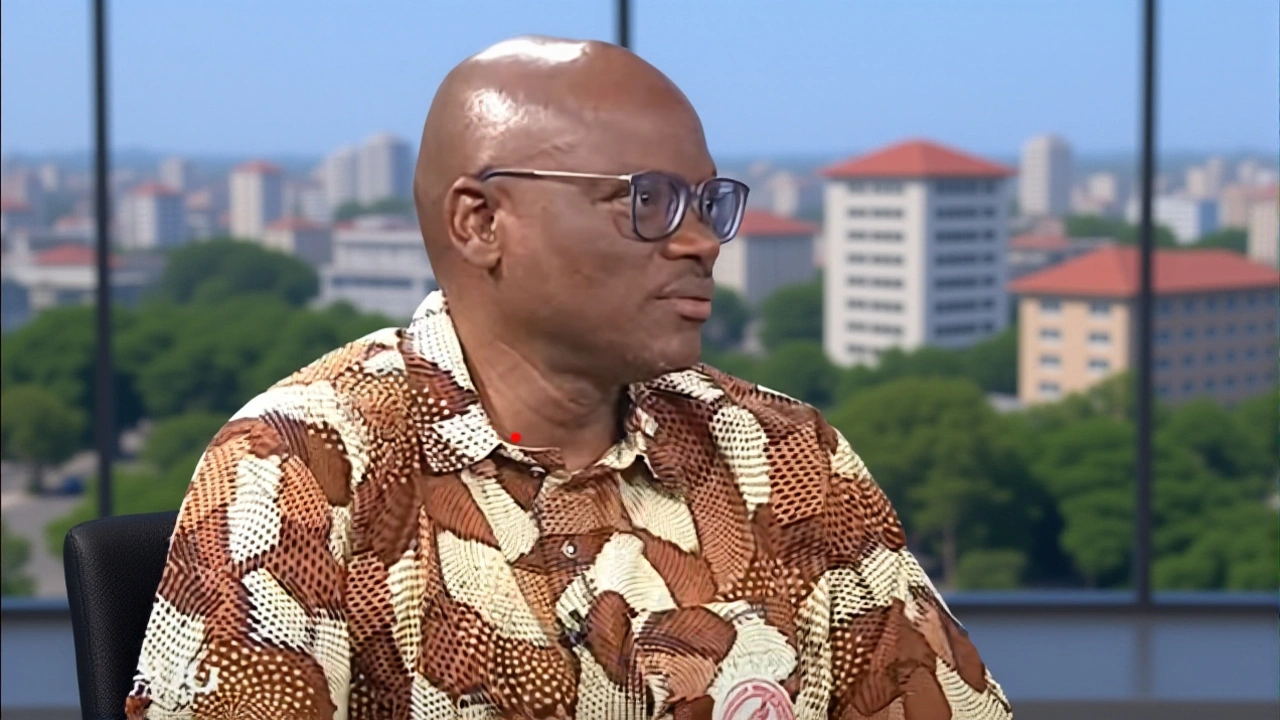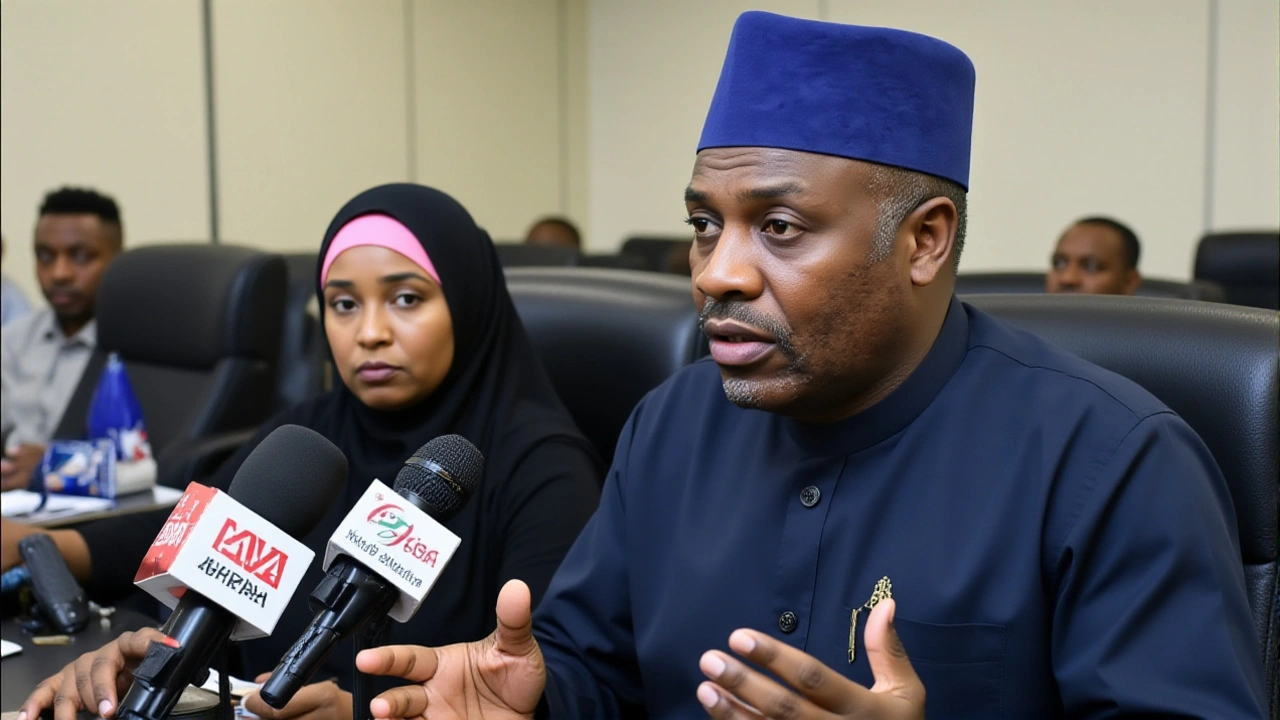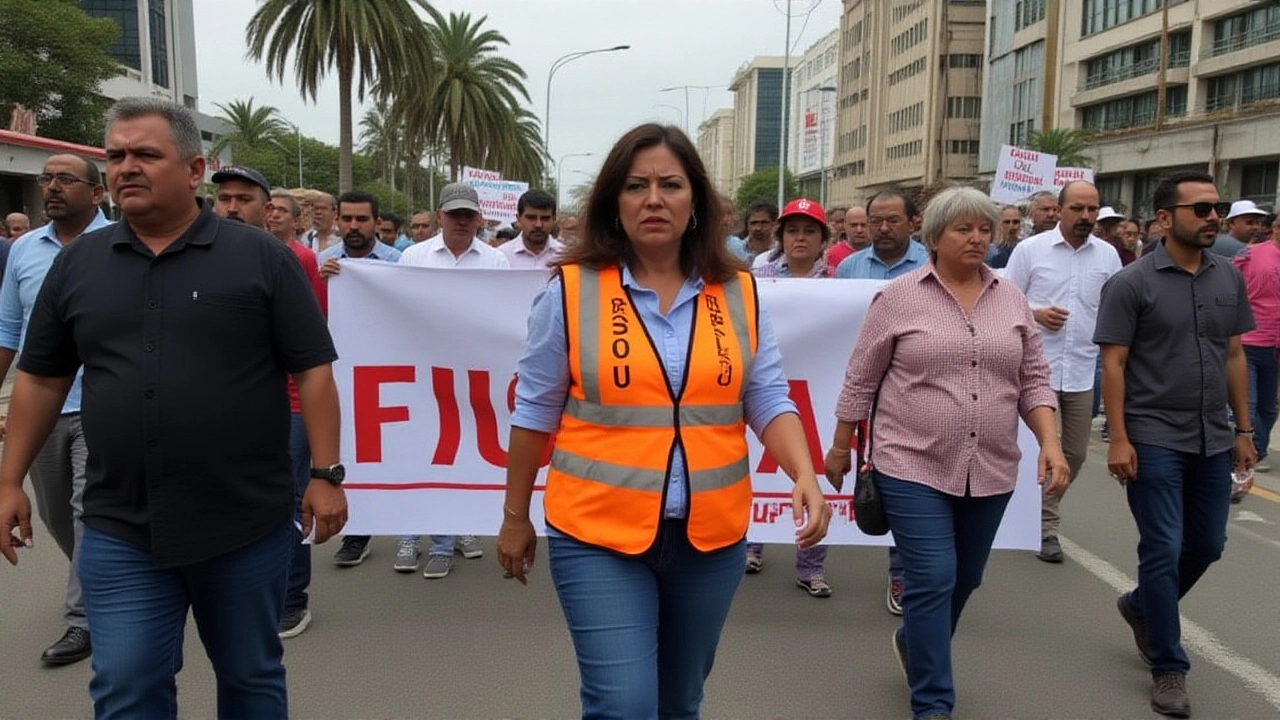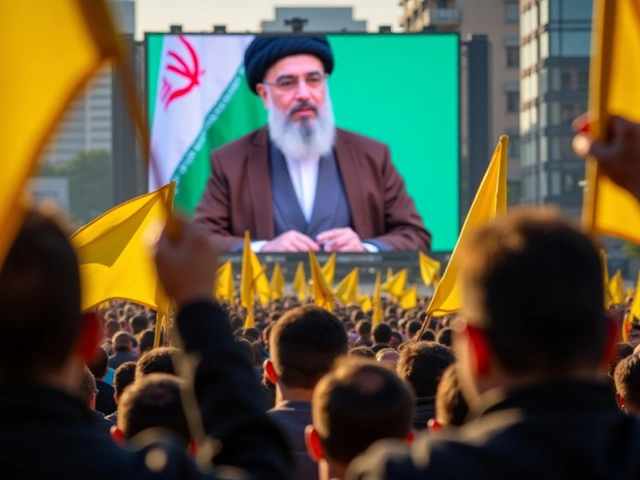When Professor Chris Piwuna, National President of Academic Staff Union of Universities announced a two‑week warning strike to begin at 12:01 a.m. on Monday, 13 October 2025, the nation’s public‑sector education system braced for a near‑complete shutdown. The directive, issued during a press briefing at University of Abuja on 12 October, orders every lecturer in Nigeria’s 45 federal universities to cease teaching, supervision, examinations and all statutory duties.
Background to the Dispute
Since August 2025, ASUU has been pressing the federal government for the implementation of a series of long‑standing demands: payment of earned academic allowances, a revised salary scale for lecturers, and a clear funding formula for public universities. The union points to a lingering arrears bill of N1.467 trillion dating back to the 2017‑2021 period, a figure that fuels both staff frustration and student unrest.
Earlier, on 28 September 2025, the union’s National Executive Council (NEC) issued a 14‑day ultimatum, warning that failure to meet the demands would trigger industrial action. That deadline expired on 12 October, setting the stage for today’s declaration.
The Warning Strike Announcement
At the Abuja briefing, Professor Piwuna said, “This two‑week window is the government’s last chance to honour its commitments. If they miss it, we will resume with a strike that is total and irreversible.” He added that the strike would affect the critical examination period for thousands of final‑year students.
The union released a concise list of demands:
- Immediate payment of all outstanding academic allowances.
- Full implementation of the Revised University Academic Staff Scale (RUASS).
- Allocation of additional funding to clear infrastructural deficits.
- Establishment of a transparent payroll monitoring system.
These points were echoed in a circular signed by Dr. Salim Ahmad, Chairperson of the ASUU branch at Federal University Dutse, confirming that all academic activities on that campus would halt at 12:01 a.m. on 13 October.
Government Response and Negotiations
Just four days earlier, Tunji Alausa, Minister of Education, had appealed to the union to “shelve the action” in a news conference, stressing that President Bola Tinubu had issued “clear directives” to avoid another disruption in tertiary institutions. Alausa also announced the reconstitution of the Mahmud Yayale Ahmed Federal Government Tertiary Institutions Expanded Negotiation Committee, tasked with fast‑tracking talks.
ASUU dismissed the outreach as “a little too late,” accusing the government of presenting a “document hurriedly put together” without concrete promises. The union’s NEC spokesperson, Dr. Nuhu Ojima, warned that the strike would become indefinite if the window closed without substantive progress.

Impact on Universities and Students
The strike’s immediate effect ripples across campuses from University of Ibadan to the University of Lagos, halting lectures for roughly 1.5 million students. Examination timetables are now in jeopardy, and many final‑year candidates risk delayed graduation.
Staff unions outside academia have voiced solidarity, while civil‑society groups warn that prolonged disruption could erode public confidence in higher education. A poll by The Nation Online indicated that 63 % of Nigerians support the lecturers’ demands, but only 41 % favor a two‑week strike given its impact on students.
Potential Next Steps
ASUU’s NEC is slated to reconvene on 27 October 2025. If the government fails to present a satisfactory package, the union has pledged to “take action that will certainly be different from this two‑week warning strike,” hinting at an indefinite, total halt of academic activity.
Analysts suggest that a resolution will likely require a multi‑phase payment plan for the arrears, a legally binding salary‑scale amendment, and a transparent monitoring mechanism overseen by an independent audit body. Failure to address these core issues could trigger further industrial actions, reminiscent of the 2022 nationwide strike that lasted 100 days.

Historical Context of ASUU Strikes
ASUU’s confrontations with successive governments date back decades. The 2020 agreement, intended to settle a series of demands, left several clauses unimplemented—most notably the $1.24 billion (≈N1.467 trillion) arrears on salaries and allowances. The 2022 strike, which lasted over three months, ended only after the government agreed to a phased payment schedule, a promise that was only partially honoured.
Given this track record, many observers view the current strike as a litmus test for President Tinubu’s willingness to engage in good‑faith negotiations and to restore stability to Nigeria’s higher‑education sector.
Frequently Asked Questions
How will the strike affect students slated to sit exams in October?
With teaching, supervision and exam invigilation halted at all 45 federal universities, any exams scheduled between 13 October and 27 October are postponed. Universities have announced tentative rescheduling windows, but exact dates will depend on when a settlement is reached, potentially pushing graduation timelines into the next academic year.
What are the union’s core demands beyond salary arrears?
ASUU is seeking full implementation of the Revised University Academic Staff Scale, timely payment of earned allowances, a transparent payroll monitoring system, and increased federal funding to address infrastructural decay and research deficits across public universities.
What role is President Bola Tinubu playing in the negotiations?
President Tinubu has publicly instructed the Education Ministry to avoid further disruption and ordered the creation of an expanded negotiation committee. However, critics argue his administration has yet to present a concrete financial package that satisfies the union’s demands.
Could the strike extend beyond the two‑week warning period?
ASUU’s NEC has warned that if the government fails to meet the demands by 27 October, the union will move to an indefinite strike. This scenario would mean a total shutdown of academic activities until a mutually acceptable resolution is reached.
What impact might the strike have on Nigeria’s economy?
A prolonged halt in university operations can delay the graduation of qualified professionals, affecting sectors such as health, engineering, and education. Moreover, the disruption could deter foreign investment in research collaborations and diminish the country’s human‑capital development trajectory.







18 Comments
Honestly, this whole strike is just a staged drama to get headlines. The union already knows the government’s limits and is playing chess, not checkers.
What they don’t tell you is that foreign donors are pulling the strings behind the scenes, trying to manipulate Nigeria’s education for their own agenda. The government’s “offers” are just a façade.
The warning strike is a calculated move that reveals the deep‑seated disconnect between the academic elite and the state apparatus.
By announcing a two‑week window, ASUU is trying to appear reasonable while actually preparing the ground for a far more disruptive escalation.
The arrears of N1.467 trillion are not merely a budgetary oversight; they are a symptom of chronic mismanagement that has been ignored for years.
Lecturers have been forced to juggle teaching, research, and personal survival under hopeless conditions, and their patience has reached a breaking point.
The government’s half‑hearted promises to “re‑constitute” negotiation committees are nothing more than window dressing to placate public outcry.
When the union says the strike will be “total and irreversible,” they are signaling that the patience of the federal administration is already exhausted.
Students, who already bear the brunt of delayed graduations, will now suffer even more as exam timetables are thrown into chaos.
This is not just an academic issue; it threatens the pipeline of professionals that the Nigerian economy desperately needs.
The political calculus is clear: the ruling party cannot afford to be seen as neglecting the education sector, especially with elections looming.
Yet, the same party continues to siphon funds to other projects, leaving higher education starved.
The involvement of other staff unions shows a broader coalition of discontent that could spill over into other public services.
If the government fails to meet the demands by the October 27 deadline, we can expect an indefinite halt that will freeze research projects and international collaborations.
The historical pattern of broken agreements after 2020 only reinforces the distrust that fuels this confrontation.
Moreover, the lack of a transparent payroll monitoring system makes it impossible to verify any future payments, deepening suspicion.
International bodies watching Nigeria’s higher‑education sector may reconsider funding unless a credible resolution is reached.
In sum, the strike is a pressure tactic that could force the government’s hand, but at the cost of a generation of students hanging in limbo.
From a policy‑analysis standpoint, the negotiation matrix hinges on three critical variables: fiscal bandwidth, legislative endorsement, and implementation oversight. The union’s demand list aligns with the standard remuneration framework (SRF) and the institutional capacity model (ICM), which should be incorporated into the revised funding formula.
It is evident that the current impasse stems from a misalignment of contractual obligations vis‑à‑vis fiscal realpolitik. The exigent arrears constitute a breach of the covenantal duty owed to academic personnel, thereby undermining the normative equilibrium of the public university system. A comprehensive remediation plan, predicated upon phased disbursement protocols and statutory audit mechanisms, is requisite to restore institutional legitimacy.
It’s not about wages, it’s about power.
When you strip away the rhetoric, the core issue is trust. Academia needs a reliable partner in the state, and the state needs to honor its contractual promises to keep the knowledge engine humming.
Enough of the excuses – fund the universities or watch the nation’s future crumble.
Oh great, another “quick fix” that’ll probably take as long as a snail on a treadmill. yolo, right?
Let’s remember that every lecture hall filled, every research grant awarded, ultimately lifts our communities. Solidarity among educators is the bedrock of societal progress, and this strike underscores that we must stand together for a brighter tomorrow.
They say education is a right, yet the government treats it like a pawn in political games. The students are the silent casualties, watching their futures being tossed around like a cheap toy.
While the union vocalizes noble intentions, their approach borders on theatrical grandstanding rather than constructive negotiation. A measured, evidence‑based discourse would serve them better than flamboyant declarations.
Hey folks, I get the frustration-but let’s channel that energy into productive dialogue. If we keep the conversation respectful and solutions‑focused, there’s a real chance to break this deadlock.
Sure, because throwing more money at broken systems has worked sooo well before 🙄. Maybe we should just print money and hope the problems go away, lol.
Keep your heads up, everyone! This is a tough spot, but together we’ll push for a win.
Honestly, I think the whole strike is overhyped – they’ll probably settle before the deadline and all this drama is just media hype.
What a tragic parade of broken promises! The nation’s scholars are being forced to watch their dreams dissolve like mist on a hot Lagos morning.
I see where you’re coming from, but the evidence points to a stalemate that won’t resolve without real concessions. Let’s stay realistic about the timeline.